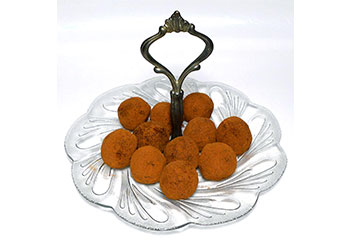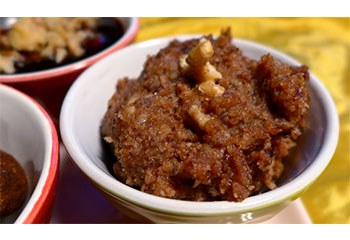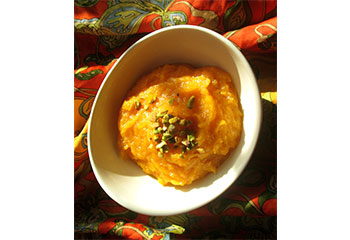Are you looking for a different twist on haroset for your Pesach table? I was delighted to discover a creative collection of haroset recipes in Jennifer Felicia Abadi’s cookbook, Too Good to Passover: Sephardic & Judeo-Arabic Seder Menus and Memories from Africa, Asia and Europe, some of which are shown below. This may be the first Passover cookbook that specializes in traditional Sephardic, Judeo-Arabic and central Asian recipes and customs (covering both pre- and post-Passover rituals). It will appeal to Sephardic, Mizrahic, and Ashkenazic people who are interested in incorporating something traditional, yet new, into their seders.
A compilation of more than 200 Passover recipes from 23 Jewish communities, this cookbook-memoir provides an anthropological and historical context to the ways in which the Jewish communities of north Africa, Asia, the Mediterranean and the Middle East observe this beloved ancient festival.
In addition to full seder menus and Passover recipes to serve throughout the holiday, each chapter opens with reflections from a few individuals from the region. Readers learn about the person’s memories of Passover, along with the varying customs and pre-Passover rituals. These include cleaning the home of all hametz, seder customs, such as reenacting the Israelites’ exodus from Egypt, as well as post-Passover celebrations, such as the Moroccan Mimouneh for marking the end of the week-long “bread fast.” These customs provide a more complete sense of the cultural variations of the holiday.
Too Good to Passover is a versatile and inspiring reference cookbook that should appeal to those who may want to switch things up on Passover and try different customs.
Moroccan-style haroset
Haroset:
o 1 cup walnuts
o 1/2 cup slivered almonds
o 12 large Medjool dates, or 20 regular-size dates, pitted and cut into large pieces
o 1/2 cup golden raisins
o 1/2 cup dark raisins
o 3-4 tbsp. sweet Passover wine
For Serving:
o Cinnamon (for rolling and dusting the outside)
o 1 box matzah squares or mini matzah crackers
1. Place the walnuts and almonds in a food processor and pulse until coarsely ground, but not into a meal-like consistency (about 30 seconds).
2. Add the dates and raisins and combine in the food processor for about 30 seconds.
3. Add the wine and pulse until the mixture becomes a soft paste.
4. Taking one level tablespoon (or mini melon ball scoop) at a time, roll the thick paste into one-inch balls. If the paste is sticking too much to your hands, try dipping your hands in cold water and then rolling them.
5. When all of the balls have been rolled, pour a couple of tablespoons of ground cinnamon onto a small plate and gently roll each ball in the cinnamon to lightly coat the outside. (You can also dust your hands with cinnamon and then roll each ball again between your palms to lightly coat, whichever way is easier.)
6. Serve haroset balls at room temperature, stacked in a small, decorative bowl, or on a small platter alongside tea matzahs. Store balls in a tightly covered plastic container between layers of parchment or wax paper in the refrigerator for up to three days, or the freezer for up to one month. Serves 12.
Portuguese-style haroset
o 1/4 cup walnuts
o 1/4 cup whole raw almonds
o 1/4 cup pistachios (without shells)
o 1/2 tsp. ground allspice
o 1/2 tsp. cinnamon
o 1/2 tsp. ginger powder
o 1/2 tsp. nutmeg powder
o 12 regular pitted dates (not large Medjool), cut in half
o 1/4 cup golden raisins
o 1 large (9-inch) ripe banana, cut into 1-inch cubes (about 1 cup)
o 1/4 cup any homemade red sangria (or mixture of 3 tbsp. dry red wine with 1 tbsp. orange juice and 1 tsp. sugar)
o 1-2 tsp. honey
1. Preheat the oven to 400 F. Spread the nuts out in a small baking pan and toast until lightly browned, about 15 minutes, shaking the pan every five minutes to evenly distribute. Remove from heat and cool completely.
2. Pour nuts and spices into a food processor and pulse quickly three or four times, to crush, but not finely grind.
3. Add the dates and raisins and pulse several more times.
Syrian-style haroset
Haroset:
o 2 cups whole Turkish dried apricots
o 1/2 cup orange juice
o 3/4 cup hot water
o 2 tbsp. coconut sugar or unrefined whole cane sugar
o 3 tbsp. freshly squeezed lemon juice
o 2-3 tbsp. orange blossom water
o 1/4 cup shelled, unsalted pistachios or whole blanched almonds, coarsely chopped
For Serving:
o 2 tbsp. unsalted pistachios, or whole blanched almonds, finely ground
1. Combine apricots, orange juice, water and sugar in a small saucepan and bring to a boil over medium-high heat. Reduce the heat to medium-low and simmer, covered, until apricots are very soft and mushy, 30-40 minutes. (Make sure to stir every five to 10 minutes to prevent burning.)
2. Pour hot apricot mixture into a food processor and add the lemon juice and orange blossom water. Pulse for one to two minutes, until it forms a smooth paste. Scoop into a medium-sized bowl and mix in the chopped nuts by hand. Cool to room temperature.
3. Serve haroset at room temperature in a small, decorative bowl, garnished with finely ground pistachios or almonds. Serves eight.
Visit Jennifer Abadi‘s website for more info.
Norene Gilletz is the leading author of kosher cookbooks in Canada. She is the author of 12 cookbooks and divides her time between work as a food writer, food manufacturer, consultant, spokesperson, cooking instructor, lecturer and cookbook editor. Norene lives in Toronto. For more information, visit her website at gourmania.com, or email her at [email protected]



